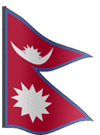Dengue Control Programme
Dengue, a mosquito-borne disease emerged in Nepal in the form of Dengue Fever (DF), Dengue Hemorrhagic Fever (DHF) and Dengue Shock Syndrome (DSS). The earliest cases were detected as early as 2005. The sporadic cases continued and outbreaks occurred in 2006 and 2010. Initially most of the reported cases had travel history to neighbouring country (India), however lately indigenous cases were also reported.
The affected districts were Chitwan, Kanchanpur, Kailali, Banke, Bardiya, Dang, Kapilvastu, Parsa, Rupandehi, Rautahat, Sarlahi, Saptari and Jhapa, indicating spread throughout the country from west to east lying in the plain Terai region. During 2011, 79 confirmed cases were reported from 15 districts with the highest case incidence in Chitwan (n=55)
Aedes aegipti (mosquito-vector) has been identified in 5 peri-urban areas of Terai region (Kailali, Dang, Chitwan, Parsa and Jhapa) during entomological surveillance conducted by EDCD during the year 2006-2010, indicating local transmission of dengue.
Studies carried out in close collaboration with WARUN/AFRIMS in the year 2006 by EDCD/NPHL showed all 4 sub-types (DEN-1, DEN-2, DEN-3 and DEN-4) of Dengue virus circulation in Nepal.
Programme implemented by:
Disease Control Section
Epidemiology and Disease Control Division
Department of Health Services (DoHS)
Teku, Kathmandu
T : 01-4255796
F : 01-4262268

